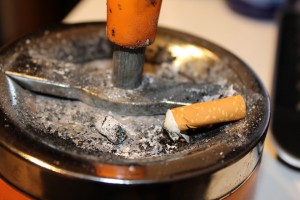When it comes to clear triggers for allergy sufferers, there are few more pervasive and polarizing than cigarette smoke. For decades now, cigarettes and the smoke they invite into our homes has been not just a nuisance, but also dangerous. Whether you’re moving into a new home that was previously inhabited by a smoker, or are making a lifestyle change and want your home to match, the transformation into a smoke-free household is one that houses do not make easily.
Smoke and its residue burrows deeply into the walls, carpets, furniture, and foundations of homes, but with a bit of work and some thoughtful decisions you can considerably reduce these odors at your house.
The Dangers of Smoking at Home
The smoke smell and residue we find in our homes is more than just an inconvenience and threat to the well-being of allergy sufferers. The phenomenon of third-hand smoke, a deadly combination of smoke residue and dust already in our homes, can present a cancer risk to anyone living in a smoker’s home, especially children.
Third-hand smoke is everywhere, like smoke fumes themselves. A partial list of surfaces affected by this scourge includes hair, skin, clothes, furniture, drapes, walls, bedding, carpets, dust, vehicles, and other surfaces. The residue and danger of third-hand smoke persists long after an individual or household has stopped smoking.
According to WebMD, the only way to protect nonsmokers from third-hand smoke is to create a smoke-free environment, whether that’s your private home or vehicle, or in public places, such as hotels and restaurants. Below, we’ll talk more about ways to neutralize this threat as naturally as possible, so as not to aggravate allergies further.
Removing Smoke Odors from Soft Surfaces
Cigarette smoke burrows deep into soft surfaces like couches, drapes, and carpeting. While Febreze is a go-to solution for many other soaked-in smells, cigarette smoke is simply outside its expertise. Consider, instead, the power of baking soda or vinegar to pull out and neutralize persistent smoke odors. For carpets and furniture, liberally sprinkle baking soda (scented, if you like!) on the surfaces and allow it to sit as long as possible 36 to 48 hours would be ideal before vacuuming the powder away.
For drapes, blankets, or laundry, a run through the rinse cycle with vinegar, before a standard cycle with detergent, can help neutralize a lingering smoke scent. While the smell of vinegar is, for many, no more pleasant than cigarette smoke, it has fewer dire consequences and fades over time neither of which are true of cigarette smoke.
For a room that continues to hold stale smoke odors, consider leaving a can of coffee beans open. It is a known odor neutralizer, but should really only be used if you don’t mind the smell of coffee! For those who do object to coffee scents, activated charcoal can provide a similar benefit without its own distinct smell.
Removing Smoke Odors from Hard Surfaces
Hard surfaces like walls, ceilings, or finished furniture can be tougher to remove smoke odors from. Pores in paint or varnish will hold tightly onto the scent, making neutralization harder than it is on soft surfaces.
A vinegar-water solution can help neutralize the odors and remove some of the residue that leaves unpleasant smells behind. A 75% vinegar/25% water mixture, applied to walls and treated furniture in a thin layer, will make a world of difference for reducing smoke smells. For especially powerful cases, walls may need to be treated with an anti-mildew primer and repainted.
Keeping Smoke Odors Away for Good
Once you’ve done all this work to remove stubborn smoke odors from your home, you’ll want to protect the pristine nature of your surroundings, and you should. To that end, any visitors or continuing smokers should okay partaking outside the home, away from open doors or windows.
If smokers are too close to windows or doors, anyone passing through the path of their smoke can bring residue and offending smells back into the house, starting the cycle once again. If scents resurface in the laundry, repeat the vinegar rinse prior to a regular wash cycle to neutralize trapped odors. Carpets may need to periodically deodorized with baking soda or activated charcoal.
A smoke-free home is a welcoming home to those with allergies, and to anyone who is sensitive to strong smells, but, beyond that, it’s also safer for the health of those spending time inside. By taking the time and energy to remove these odors and residue from your home, you demonstrate care not just for the comfort, but also for the health of your guests and family.



